
Newsletter
Japan-IMF Scholarship Program for Asia
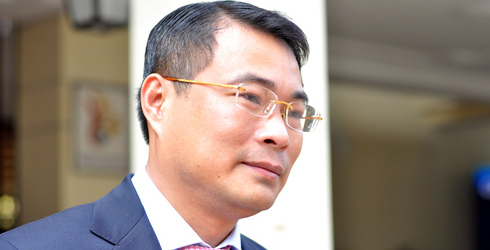
Deputy Governor Le Minh Hung, State Bank of Vietnam
JISPA Alumnus (1996-97), Graduate School of Policy Science of Saitama University (Predecessor of GRIPS)
vol 1. May 2013
To commemorate the 20th anniversary of the JISPA, this newsletter, published quarterly for 2013, brings you up-to date information on JISPA events as well as featured alumni and scholars. JISPA provides scholarships for junior government officials of key economic agencies in Asia and the Pacific who wish to undertake graduate studies in related fields at universities in Japan.
Latest Issue20th Anniversary of the Japan-IMF Scholarship Program for Asia (JISPA)
In 2013, the Japan-IMF Scholarship Program for Asia (JISPA) celebrates its 20th anniversary. Since its inception in 1993, the JISPA has been recognized as a unique program by targeting junior officials from key economic agencies, and has now established its reputation by producing a number of alumni who play major roles in policy making in their home countries. The program is conducted with collaboration among the Japanese Government, the IMF, and the Japanese universities with their commitment to and efforts for capacity building to contribute to sustainable economic growth in the region.
The JISPA has awarded scholarships to 567 officials from Asia and the Pacific, and 492 officials have graduated from the program. Many of the alumni have already taken up mid-level to senior positions and play key roles in economic policy making in their home countries. Their achievements and contribution to their countries continue to encourage junior officials to apply for the JISPA. This first issue features Mr. Le Minh Hung, Deputy Governor of the State Bank of Vietnam, as a highly successful alumnus. Deputy Governor Minh Hung also headed the Vietnamese delegation to the IMF-World Bank Annual Meetings in Tokyo held in October 2012. His interviews can be found in the "Alumni News" (read more).
JISPA Today
JISPA Seminars
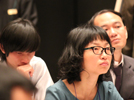 OAP organized seminars exclusively for JISPA scholars to provide better understanding on current policy issues. On January 10, 2013, Mr. Benedict Clements, Division Chief, Fiscal Affairs Department, IMF, gave a presentation entitled "The Economics of Public Health Care Reform in Advanced and Emerging Economies".
Read More
OAP organized seminars exclusively for JISPA scholars to provide better understanding on current policy issues. On January 10, 2013, Mr. Benedict Clements, Division Chief, Fiscal Affairs Department, IMF, gave a presentation entitled "The Economics of Public Health Care Reform in Advanced and Emerging Economies".
Read More
Alumni News
JISPA has contributed fruitfully and naturally to the demanding and multidisciplinary policy work.
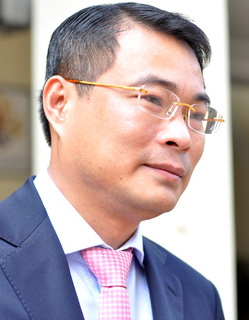 Mr. Le Minh Hung was appointed as the Deputy Governor of the State Bank of Vietnam in October 2011. He studied at the Graduate School of Policy Science of Saitama University (Predecessor of GRIPS) in the 1996-97 academic year under the JISPA. Here is an interview with Deputy Governor Minh Hung.
Read More
Mr. Le Minh Hung was appointed as the Deputy Governor of the State Bank of Vietnam in October 2011. He studied at the Graduate School of Policy Science of Saitama University (Predecessor of GRIPS) in the 1996-97 academic year under the JISPA. Here is an interview with Deputy Governor Minh Hung.
Read More
Current Scholar
To become one of the Thai major cogwheels in positively driving the nation forward.
 Ms. Siriwan Assawawongsathien has been studying at Graduate School of Public Policy, the University of Tokyo since October 2011 on a study leave from the Bank of Thailand. She loves travelling around Japan and exploring Japanese cultural activities during break from her intensive studies. Please read an interview with Ms. Siriwan.
Read More
Ms. Siriwan Assawawongsathien has been studying at Graduate School of Public Policy, the University of Tokyo since October 2011 on a study leave from the Bank of Thailand. She loves travelling around Japan and exploring Japanese cultural activities during break from her intensive studies. Please read an interview with Ms. Siriwan.
Read More

Photo of the month
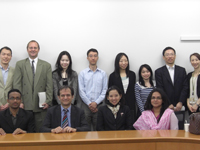
OAP Staff Visit to the University of Tokyo, May 8, 2013
Events
Sep 22

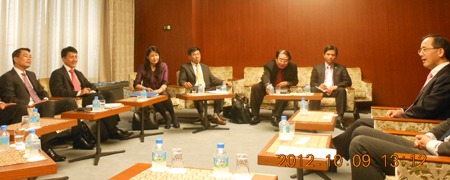

 This trip really equipped me with first-hand experiences about the current situation of the affected area. Seeing and talking to those people provided me examples of actual social contributors. Furthermore, it was sunburn that left me with another good piece of memories from the volunteering work. Importantly, without doing the volunteer I would not have felt how difficult it is to restore everything back in place again. It all requires robust efforts, durable time, positive attitudes, and motivated hearts. What I learnt from such a trip was much more than I expected. It conveyed me countless worthwhile lessons including understanding the challenges and difficulties of real-life public policy implications, encouraging being socially responsible individual, and reminding of whom public policy is meant for. The “Never Give Up” and “Nationalistic” spirits of Japanese really motivated and I could possibly answer why Japan, no matter how many times or how severe earthquakes or natural disasters happen, remains a great country up until today.
This trip really equipped me with first-hand experiences about the current situation of the affected area. Seeing and talking to those people provided me examples of actual social contributors. Furthermore, it was sunburn that left me with another good piece of memories from the volunteering work. Importantly, without doing the volunteer I would not have felt how difficult it is to restore everything back in place again. It all requires robust efforts, durable time, positive attitudes, and motivated hearts. What I learnt from such a trip was much more than I expected. It conveyed me countless worthwhile lessons including understanding the challenges and difficulties of real-life public policy implications, encouraging being socially responsible individual, and reminding of whom public policy is meant for. The “Never Give Up” and “Nationalistic” spirits of Japanese really motivated and I could possibly answer why Japan, no matter how many times or how severe earthquakes or natural disasters happen, remains a great country up until today.